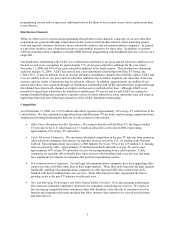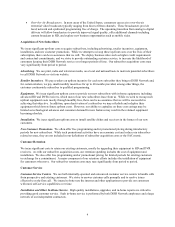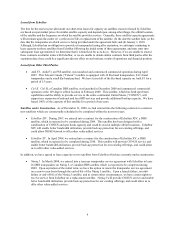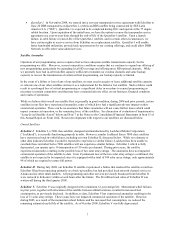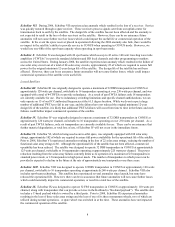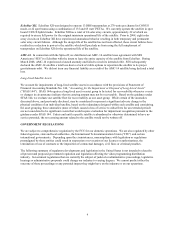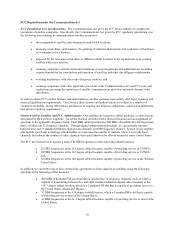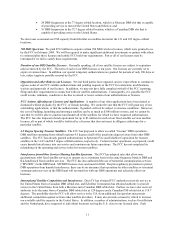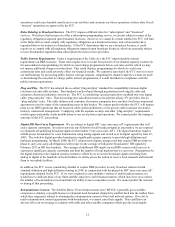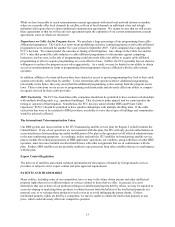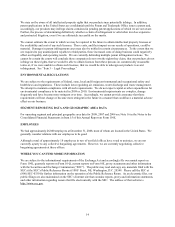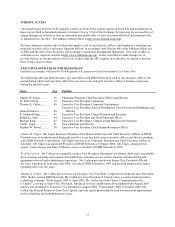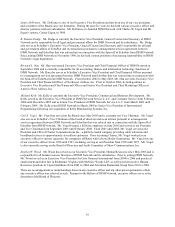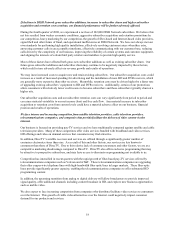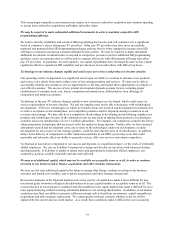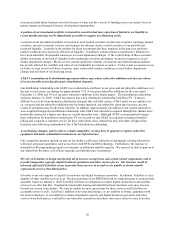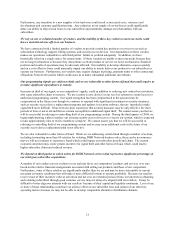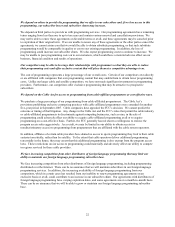Dish Network 2008 Annual Report Download - page 23
Download and view the complete annual report
Please find page 23 of the 2008 Dish Network annual report below. You can navigate through the pages in the report by either clicking on the pages listed below, or by using the keyword search tool below to find specific information within the annual report.13
While we have been able to reach retransmission consent agreements with most local network stations in markets
where we currently offer local channels by satellite, roll-out of local channels in additional cities and in high
definition will require that we obtain additional retransmission agreements. We cannot be sure that we will secure
these agreements or that we will secure new agreements upon the expiration of our current retransmission consent
agreements, some of which are short-term.
Dependence on Cable Act for Program Access. We purchase a large percentage of our programming from cable-
affiliated programmers. The Cable Act’s provisions prohibiting exclusive contracting practices with cable affiliated
programmers were extended for another five-year period in September 2007. Cable companies have appealed the
FCC’s decision. We cannot predict the outcome or timing of that litigation. Any change in the Cable Act and the
FCC’s rules that permit the cable industry or cable-affiliated programmers to discriminate against competing
businesses, such as ours, in the sale of programming could adversely affect our ability to acquire cable-affiliated
programming at all or to acquire programming on a cost-effective basis. Further, the FCC generally has not shown a
willingness to enforce the program access rules aggressively. As a result, we may be limited in our ability to obtain
access on nondiscriminatory terms to programming from programmers that are affiliated with the cable system
operators.
In addition, affiliates of certain cable providers have denied us access to sports programming they feed to their cable
systems terrestrially, rather than by satellite. To the extent that cable operators deliver additional programming
terrestrially in the future, they may assert that this additional programming is also exempt from the program access
laws. These restrictions on our access to programming could materially and adversely affect our ability to compete
in regions serviced by these cable providers.
MDU Exclusivity. The FCC has found that cable companies should not be permitted to have exclusive relationships
with multiple dwelling units (e.g., apartment buildings). That decision is under appeal, and we cannot predict the
timing or outcome of that litigation. Nonetheless, the FCC has now asked whether DBS and Private Cable
Operators (“PCOs”) should be permitted to have similar relationships with multiple dwelling units. If the cable
exclusivity ban were to be extended to DBS providers, our ability to serve these types of buildings and communities
would be adversely affected.
The International Telecommunication Union
Our DBS system also must conform to the ITU broadcasting satellite service plan for Region 2 (which includes the
United States). If any of our operations are not consistent with this plan, the ITU will only provide authorization on
a non-interference basis pending successful modification of the plan or the agreement of all affected administrations
to the non-conforming operations. Accordingly, unless and until the ITU modifies its broadcasting satellite service
plan to include the technical parameters of DBS applicants’ operations, our satellites, along with those of other DBS
operators, must not cause harmful electrical interference with other assignments that are in conformance with the
plan. Further, DBS satellites are not presently entitled to any protection from other satellites that are in conformance
with the plan.
Export Control Regulation
The delivery of satellites and related technical information for the purpose of launch by foreign launch services
providers is subject to strict export control and prior approval requirements.
PATENTS AND TRADEMARKS
Many entities, including some of our competitors, have or may in the future obtain patents and other intellectual
property rights that cover or affect products or services related to those that we offer. In general, if a court
determines that one or more of our products infringes on intellectual property held by others, we may be required to
cease developing or marketing those products, to obtain licenses from the holders of the intellectual property at a
material cost, or to redesign those products in such a way as to avoid infringing the patent claims. If those
intellectual property rights are held by a competitor, we may be unable to obtain the intellectual property at any
price, which could adversely affect our competitive position.


